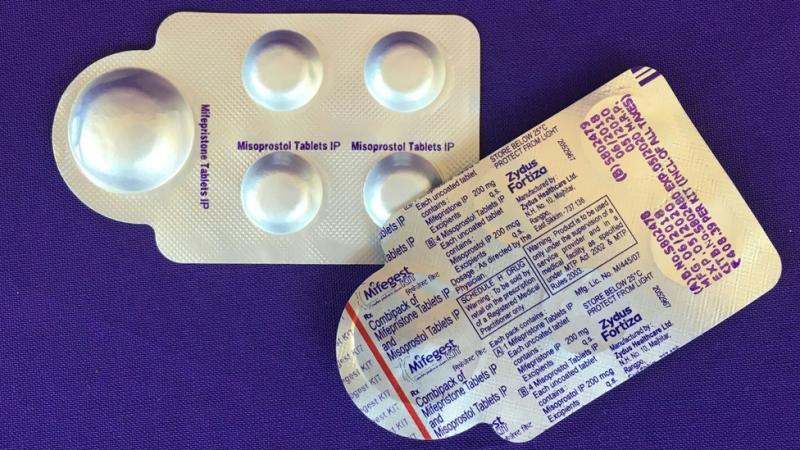A Chilling Effect of Louisiana’s Abortion Law



Louisiana just became the first state to reclassify abortion pills as controlled dangerous substances. The law may signal a new strategy to curb reproductive-health-care access in post- Roe America.
All Eyes on Louisiana
Late last week, the governor of Louisiana signed into law a bill that marks a first in the battle over reproductive rights in America: The state will categorize mifepristone and misoprostol, medication commonly used in abortions, as controlled dangerous substances. Possessing the drugs without a valid prescription will be a criminal offense that could carry up to 10 years in prison. Abortion pills in Louisiana are now in the same category as drugs such as opioids and Xanax—medicines that are thought to be at risk of abuse—even though the medical community and the FDA widely consider mifepristone and misoprostol to be safe.
The original version of the bill, introduced by Republican State Senator Thomas Pressly in March, focused on criminalizing coerced abortion . Pressly has said that he was moved to act when his sister discovered in 2022 that her then-husband had mixed misoprostol in her drinks without her knowledge. After that version of the bill had passed unanimously in the state Senate, Pressly proposed a controversial amendment that would reclassify abortion pills as controlled substances, saying in an interview with KSLA News that he wanted to “make sure they’re not put in the hands of bad actors and criminals.” The amended version of the bill received pushback but ultimately passed.
In Louisiana, where abortions have been banned in most cases since 2022, the use of mifepristone and misoprostol to induce abortions is already highly restricted—so the new legislation will largely disrupt other medical treatments. Mifepristone and misoprostol have routine medical uses , such as inducing childbirth, stopping postpartum hemorrhages, and treating miscarriages. Under the new law, doctors must have a specific license to prescribe the drugs, and the pills would need to be stored in special facilities that rural clinics may find difficult to access. Experts predict that confusion about the law and fear of prosecution will have a chilling effect on patients and health-care providers.
Medical professionals have raised alarms, with more than 200 doctors in the state reportedly signing a letter warning that Louisiana’s legislation would cause confusion and present barriers to effective care. Because physicians haven’t been prescribing the pills for abortions in Louisiana, the law will “likely have minuscule impacts on abortion and more significant impacts on miscarriage and obstetric care,” Greer Donley, a law professor at the University of Pittsburgh who has written for The Atlantic , explained to me in an email. (She also noted that the legislation won’t affect people who currently receive abortion pills in the mail from organizations operating legally under shield laws , and that pregnant patients who obtain the drugs for their own use won’t be penalized.)
“Health professionals who need to prescribe the medication for any reason—even the many uses of the drug that are not termination of pregnancy—will now have to jump through many hurdles,” Melissa Goodman, the executive director of UCLA Law’s Center on Reproductive Health, Law and Policy, told me in an email. “Delays are likely.” She noted that the new restrictions may drive health-care providers to leave Louisiana—a state that already has bleak maternal-health outcomes—and that this law could set a precedent for activist groups that may try to make medications such as contraceptives and mental-health treatments illegal for ideological reasons.
Mifepristone and misoprostol have become a flash point in the fight over abortion access. Last year, there were more than 640,000 medication abortions in the United States—more than 60 percent of abortions in the formal health-care system, according to the Guttmacher Institute . That was up from 53 percent in 2020, before the fall of Roe v. Wade . But these drugs have faced legal challenges across the country. Texas effectively banned mifepristone in 2023 when a judge suspended FDA approval of the drug (though an appeals court ruled to preserve access again soon after). Twenty-nine states have either outlawed abortion or have restrictions on abortion medication, according to the Guttmacher Institute, and Arizona bans the mailing of abortion pills. Currently, the Supreme Court is considering a case that would make mifepristone much harder to access, though the justices signaled in March that they would not limit access to the drug. (Some of them voiced concerns about the implications of enacting nationwide restrictions or reversing the FDA’s judgments.)
Louisiana may prove to be a bellwether, experts told me, inspiring other states to further restrict access to mifepristone and misoprostol. But Donley noted that the consequences for general health care may make the law unappealing for other states to adopt. Still, the legislation is a striking example of the lengths lawmakers may go in their attempt to curb the use of abortion pills across the country.



Sheesh, doesn't Louisiana have at least one opthamologist/politician? (full snark)
I foresee terrible trouble in Loosiana like deaths and infections leading to sterility